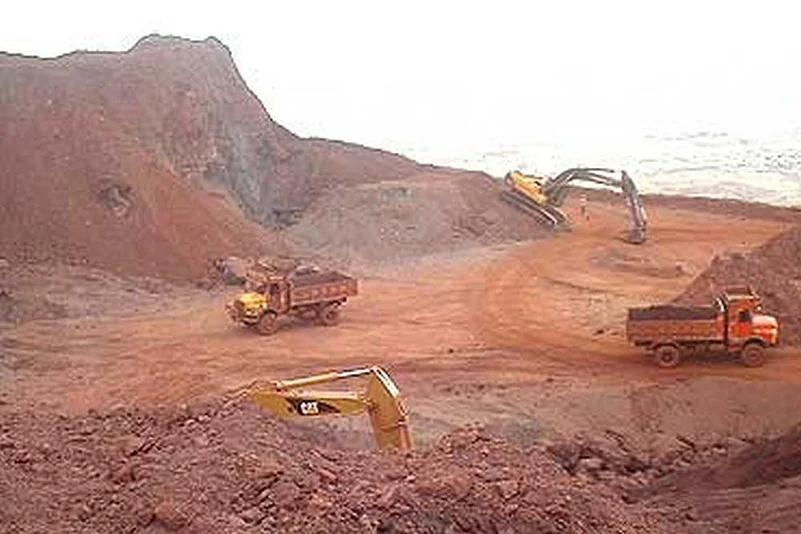The Supreme Court today rejected the plea by Federation of Indian Mineral Industries (FIMI) and Vedanta to scrap e auction of iron ore and said that the sale and purchase of iron ore in the past has been done in the "most outrageous manner" and on "unacceptable terms". The court noted that it has caused a huge leakage of public revenue.
Rejecting pleas seeking scrapping of the e-auction of minerals in Karnataka, the apex court said its "horrific" experience of the past cannot be allowed to resurface.
It said that issues of lifting of the cap on production of minerals and restoration of ecology and environment through a Comprehensive Environment Plans for the Mining Impact Zone (CEPMIZ) were under active consideration of the court.
"We, therefore, for the present, reject the application filed by Federation of Indian Mineral Industries (FIMI) South and consequently do not entertain the support to the prayers made therein by M/s Vedanta Ltd.
"For the same reasons, we do not also accept the suggestions of the Central Empowered Committee (CEC) and the State of Karnataka as made in their respective reports/ affidavits filed before the court," a bench of Justices Ranjan Gogoi, P C Pant and Navin Sinha said.
The bench said "the experience of the past has been horrific. It cannot be allowed to come back.
"Sale and purchase of iron ore had been conducted in the most outrageous manner and on wholly unacceptable terms resulting, inter alia, in huge leakage of government revenue. Such experiences and events cannot be allowed to resurface."
FIMI (Southern region) in its plea has sought that iron and manganese ore may be sold in Karnataka without recourse to e-auction conducted by the monitoring committee set up by apex court.
The plea was supported by M/s Vedanta Ltd, an iron-ore lessee operating within Karnataka through its petition.
The bench said what has been suggested by CEC and the in-principle approval of state government would seem to indicate that in place of the monitoring committee, another committee consisting of officials of Karnataka be made to oversee and supervise the sale of iron ore through a hybrid system of long term contracts and sale through an e-platform including payment of taxes, royalty.
"While it is correct that any trading process has to be free and fair with liberty to the contracting parties to work out their own terms of sale and purchase, what cannot be ignored are the circumstances which had prompted the Court to conceive of and continue with a departure from the normal rule and instead to have a regulated, if not, highly controlled system of sale and purchase of iron ore," the bench said.
It said that sale and purchase of iron ore through the court-appointed monitoring committee and by e-auction was not "a singular" but a "connected facet" of what was visualised by the Court in its bid "to check, control and regulate mining and to restore the nature and environment to its earlier pristine purity, as far as possible.
"When the said connected issues are pending, it cannot be said that the situation has become ripe for the normal rule of sale and purchase to be restored so far as the sale of iron- ore in the State of Karnataka is concerned," it said.
The apex court said that the "enormity of the illegal mining" and consequential damage to ecology and environment had led to the intervention of court and prompted it to exercise its jurisdiction under Article 142 of Constitution by its order on April 18, 2013.
The bench said that it was in this context that the constitution of the Monitoring Committee and the continuance of its role in the matter of sale of iron ore by e-auction had been conceived and continued by the Court.
The apex court said that after considering all aspects, it was of the opinion that time has now come to dispense with the existing policy of sale and purchase of iron-ore in Karnataka through the court appointed Monitoring Committee by e-auction.
"The restoration of 'normalcy' in the process of sale and purchase of iron-ore must wait for the future and at least till such time that significant headways are made in the other connected aspects of the matter dealt with by the final order of this Court dated April 18, 2013," it said.
The CEC in its report submitted in 2016, stated that it agrees with the stand of FIMI, saying that the basic objectives behind the sale of iron ore through the Monitoring Committee, have been achieved and an alternative system needs to be put in place.
The CEC submitted various suggestions including that the alterante mechanism must provide for the registration of both the buyers and sellers of iron-ore and the mining-ore lessees, must declare their statutory approvals, modalities of the Reclamation and Rehabilitation Plan.
Karnataka was in broad agreement with the suggestions of the CEC and incorporated certain additional recommendations including setting up of a Committee consisting of state officials to monitor the sale of iron ore through the e- platform on the basis of long term agreements.
The petitioner NGO, Samaj Parivartana Samudaya, had opposed any change from the existing pattern of sale of iron ore through the Monitoring Committee set up by apex court.
SC Rejects FIMI, Vedanta Plea To Scrap E-Auction Of Iron Ore, Says Its Sale Done In 'Most Outrageous Manner'

SC Rejects FIMI, Vedanta Plea To Scrap E-Auction Of Iron Ore, Says Its Sale Done In 'Most Outrageous Manner'
SC Rejects FIMI, Vedanta Plea To Scrap E-Auction Of Iron Ore, Says Its Sale Done In 'Most Outrageous Manner'
Published At:
MOST POPULAR
WATCH
MORE FROM THE AUTHOR
PHOTOS
×





















